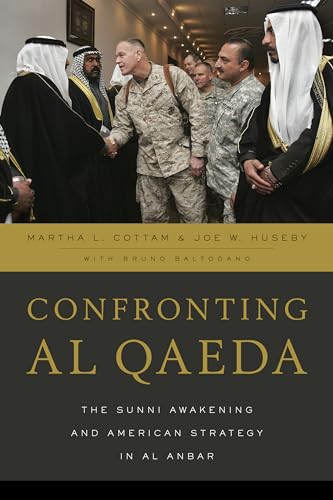Confronting al Qaeda
The Sunni Awakening and American Strategy in al Anbar
Martha L. Cottam; Joe W. Huseby Washington State University
BOOK REVIEW

In a world grappling with the echoes of terrorism and geopolitical complexities, Confronting al Qaeda: The Sunni Awakening and American Strategy in al Anbar emerges not just as a scholarly examination, but as an urgent beacon illuminating the entangled layers of conflict in Iraq. Authors Martha L. Cottam and Joe W. Huseby plunge readers into the heart of Al Anbar province, an area that has been a battleground of ideologies and military strategies, where the Sunni Awakening marked a critical turning point in the war against al-Qaeda.
This work is an invitation to face the raw realities of war, politics, and the harrowing stories of individuals caught in its web. Picture the sun-scorched streets of Fallujah, once a stronghold of insurgency, now a canvas for American military strategies and Sunni tribal dynamics. Cottam and Huseby don't shy away from the complexities; instead, they embrace them, urging you to confront the uncomfortable truths and moral ambiguities woven into the fabric of American intervention.
Delving deeper, the authors dissect the fractious relationship between local Sunni tribes and U.S. forces, shedding light on how alliances were forged in the crucible of shared interests against a common enemy. They unravel the pivotal moment when tribal leaders turned against al-Qaeda, shifting the power dynamics and redefining the American approach. This isn't merely historical recounting; it's a story of desperation, hope, and the quest for agency in a land ravaged by violence.
Critically acclaimed yet not without its detractors, this book has evoked a spectrum of responses. Readers often praise its incisive analysis and rich detail, which help demystify the strategies that shaped contemporary counterterrorism efforts. Some have argued, however, that it may lean too heavily on military tactics at the expense of exploring the human cost of these strategies. Yet, isn't it in the very acknowledgment of such tension that the necessity of this discourse lies?
The overarching narrative compels you to reflect on our role in the global landscape-how America's foreign policy shapes lives far beyond our borders. Cottam and Huseby challenge you to grapple with the implications of interventionism and the moral responsibility that comes with it. The book serves as a critical reminder that in the chaos of war, it is the stories of individual lives-the sacrifices, betrayals, and resilience-that resonate most profoundly.
As the analysis unfolds, the authors invite you to witness the kaleidoscope of human experience amidst chaos, a reminder that behind every statistic lies a story, a family, a dream extinguished. Echoing the sentiments of those who lived these experiences, Cottam and Huseby urge us to confront not only al-Qaeda but our perceptions of justice, loyalty, and the ripples of our actions on the global stage.
Confronting al Qaeda is a testament to the power of narrative in understanding conflict. It compels you to acknowledge that history is not just a sequence of events but is saturated with human emotions and existential struggles. This work isn't merely an exploration of military strategy; it's a profound exploration of what it means to navigate a world steeped in complexities that demand both scrutiny and empathy. For anyone yearning to grasp the intricate dynamics of modern warfare and its consequences, this book is an essential read that will leave you questioning not just policies, but the very essence of humanity itself.
📖 Confronting al Qaeda: The Sunni Awakening and American Strategy in al Anbar
✍ by Martha L. Cottam; Joe W. Huseby Washington State University
🧾 158 pages
2016
#confronting #qaeda #sunni #awakening #american #strategy #anbar #martha #cottam #MarthaLCottam #huseby #washington #state #university #JoeWHusebyWashingtonStateUniversity